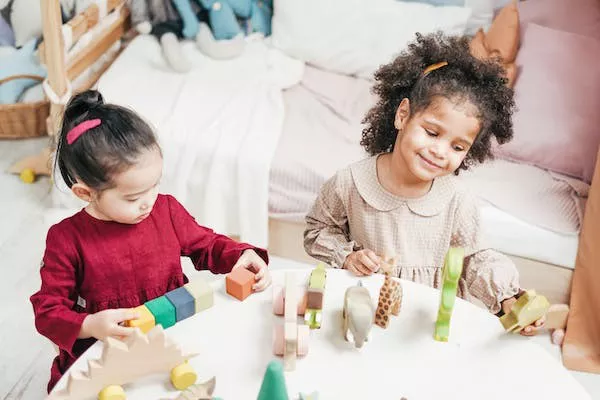The preoperational stage, according to Jean Piaget’s theory of cognitive development, is a critical period in a child’s growth and development. During this stage, which typically occurs between the ages of 2 and 7, children’s thinking becomes more symbolic and imaginative. They engage in pretend play, demonstrate egocentric thinking, and develop language skills. Choosing appropriate toys for this stage is important as it supports their cognitive, social, and emotional development. In this article, we explore the characteristics of the preoperational stage and suggest suitable toys that can enhance children’s learning and play experiences.
Understanding the Preoperational Stage
The preoperational stage is characterized by significant cognitive and developmental changes. Children at this stage begin to engage in symbolic play, represent objects and events with symbols (such as pretending a stick is a sword), and demonstrate egocentric thinking (seeing the world from their own perspective). They also show a rapid expansion of language skills, engage in imaginative play, and develop the ability to understand simple cause-and-effect relationships.
Characteristics of Toys for the Preoperational Stage
Toys for the preoperational stage should align with children’s developmental abilities and encourage exploration, creativity, and problem-solving. Here are some key characteristics to consider when selecting toys for this stage:
1. Open-Ended Play: Toys that promote open-ended play provide children with endless possibilities for exploration and creativity. These toys allow children to use their imagination, experiment with different scenarios, and come up with their own ideas and solutions. Examples include building blocks, art supplies, and pretend play sets.
2. Symbolic Play: Toys that encourage symbolic play support children’s ability to represent objects and events with symbols. These toys can include dolls, action figures, dress-up costumes, and play kitchen sets. Symbolic play allows children to engage in pretend scenarios, develop storytelling skills, and enhance their understanding of the world around them.
3. Fine Motor Development: Toys that promote fine motor skills are beneficial during the preoperational stage. Activities that involve picking up small objects, using tools like scissors or paintbrushes, or manipulating objects with precision help refine children’s fine motor control. Puzzles, threading beads, play dough, and art supplies like crayons and markers are excellent choices.
4. Language Development: Toys that support language development are crucial during the preoperational stage, as language skills expand rapidly. Look for toys that encourage conversation, storytelling, and vocabulary building. Examples include picture books, storybooks, puppets, and board games that involve communication and interaction.
5. Social Interaction: Toys that promote social interaction and cooperation are important for children’s social development during this stage. Cooperative games, building sets that require teamwork, and toys that encourage role-playing with others (such as doctor kits or tea sets) foster social skills, empathy, and cooperation.
6. Cause and Effect: Toys that allow children to understand simple cause-and-effect relationships are beneficial during this stage. These toys help children learn about action, reaction, and consequences. Examples include shape sorters, nesting toys, simple puzzles, and toys with buttons that produce sounds or movements.
Toy Recommendations for the Preoperational Stage
Based on the characteristics outlined above, here are some toy recommendations suitable for children in the preoperational stage:
1. Building Blocks: Building blocks are versatile toys that encourage open-ended play, creativity, and problem-solving. Children can construct various structures, develop spatial awareness, and enhance their fine motor skills.
2. Play Kitchen Sets: Play kitchen sets allow children to engage in pretend play, imitate real-life scenarios, and develop their imagination. They can role-play as chefs, practice social interaction, and experiment with different roles and responsibilities.
3. Art Supplies: Providing art supplies such as crayons, markers, colored pencils, and finger paints allows children to express their creativity, develop fine motor skills, and explore different forms of communication.
4. Puzzles: Puzzles with age-appropriate complexity help children develop problem-solving skills, improve hand-eye coordination, and enhance cognitive abilities. Start with simpler puzzles and gradually increase the difficulty as children progress.
5. Pretend Play Sets: Pretend play sets, such as doctor kits, tool sets, or grocery store sets, encourage imaginative play and role-playing with others. These sets promote social interaction, cooperation, and language development.
6. Board Games: Simple board games that involve turn-taking and cooperative play are excellent for developing social skills, learning rules, and practicing communication and problem-solving.
7. Musical Instruments: Musical instruments, such as toy keyboards, drums, or xylophones, foster creativity, fine motor skills, and an appreciation for rhythm and melody.
8. Storybooks and Picture Books: Storybooks and picture books not only promote language development but also stimulate imagination and foster a love for reading. Choose books with engaging illustrations and age-appropriate stories.
Conclusion
Choosing appropriate toys for children in the preoperational stage is essential for supporting their cognitive, social, and emotional development. Toys that encourage open-ended play, symbolic play, fine motor development, language skills, social interaction, and understanding of cause and effect are ideal for this stage. Building blocks, play kitchen sets, art supplies, puzzles, pretend play sets, board games, musical instruments, and books are all great options to consider. By providing toys that align with children’s developmental abilities and promote exploration, creativity, and problem-solving, parents and caregivers can facilitate an enriching and engaging play experience during the preoperational stage of development.


